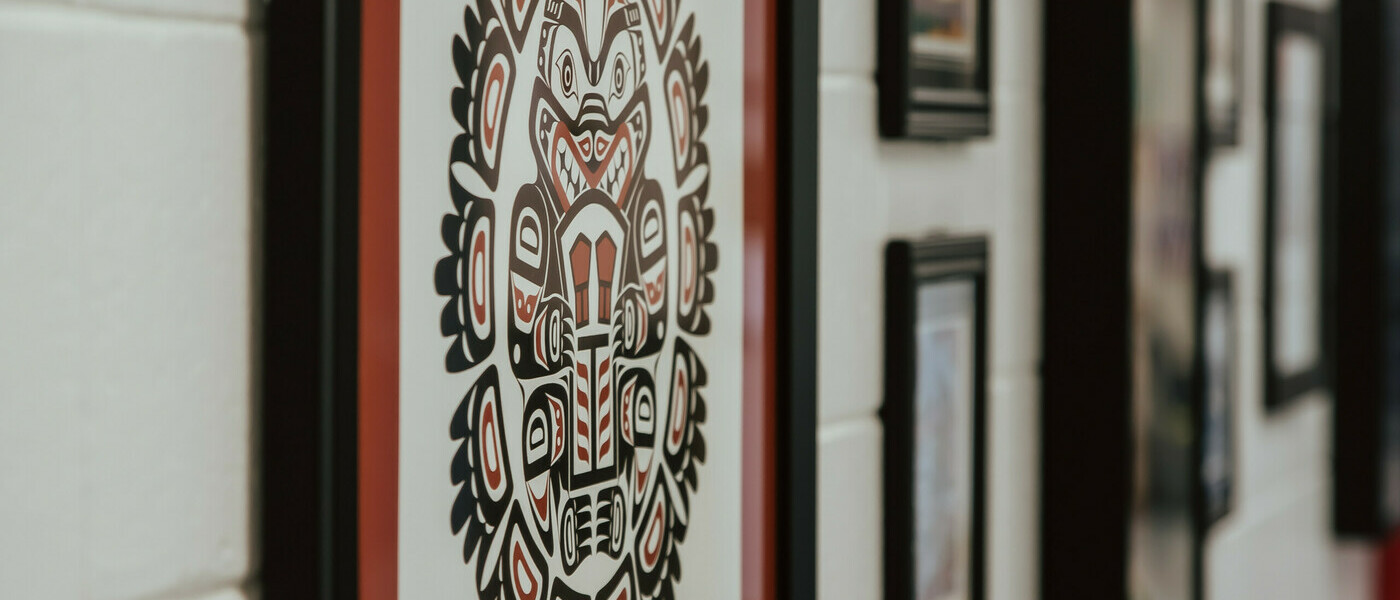2022-2023 School Year - The Journey Continues
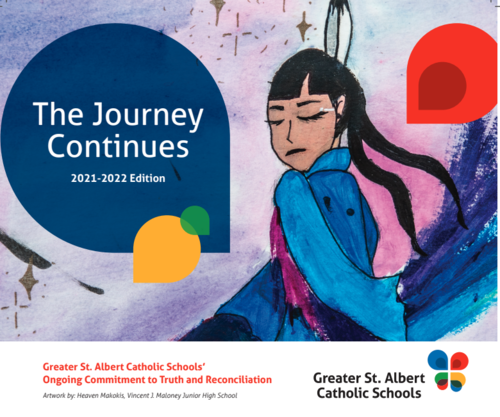
Below is the latest edition of the book, in which we compile some of the stories related to our commitment and work toward Truth and Reconciliation.
In this booklet, we have sought to capture lessons from our elders in words, pictures, and student art. This is the second, 5-year edition of what we hope will be an ongoing journey strengthening relationships, partnerships, and actions that bring us to new understandings of what it means to enact Truth and Reconciliation within our district.
Please click here to view the booklet.
The newest chapter in The Journey Continues: Greater St. Albert Catholic Schools’ Ongoing Commitment to Truth and Reconciliation showcases some 2022-2023 school year highlights.
Chapter 2 of this second edition of our book is entitled “Walking Together - Moving Toward Meaningful Reconciliation 2022-2023” (last year’s chapter was entitled “Indigenization - Fostering Deeper Connections Between Indigenous Ways of Knowing and Curriculum 2021-2022”).
Stories shared in the book include:
- Data Results
- Administrative Procedure on Smudging and Pipe Ceremonies
- National Day for Truth and Reconciliation
- Ribbon Skirts at Sister Alphonse Academy
- SGEC at Sacred Heart Church of the First Peoples
- Alexander First Nation Education Centre Visit - SKTA
- Indigenous Peoples Map of Canada
- Métis Week
- Wâhkôtowin Club - Bertha Kennedy Catholic School.
2020-2021 School Year
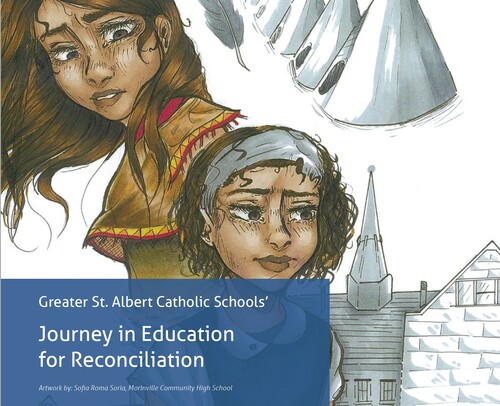
We are proud of our journey in building staff capacity to enact Truth and Reconciliation Calls to Action. We have created a book, Greater St. Albert Catholic Schools' Journey in Education for Reconciliation of our journey in which each chapter tells about one year of our experiences.
We continue to enact key strategies to ensure that every First Nations, Métis, and Inuit student sets and meets goals of personal importance to them in our Division's 2020-2023 Education Assurance Plan.
We have created one committee, our Division Curriculum Committee, that is now co-led by our Elder, Edna Arcand, and our Division staff. In this committee, we have staff from every school who take part in learning about research-based practices to support K-12 students to learn about and to enact Truth and Reconciliation in Catholic Communities. One key component is learning through story, and we provide every school with titles of fiction, non-fiction, and poetry, which have been vetted through our Elder are included and continually expanded in our Indigenous Literature Kit.
As we engage in this work together, staff are carrying forward our collective learning about Alberta's Teaching Quality Standard: Applying Foundational Knowledge about First Nations, Métis and Inuit
5. A teacher develops and applies foundational knowledge about First Nations, Métis and Inuit for the benefit of all students.
Achievement of this competency is demonstrated by indicators such as:
(a) understanding the historical, social, economic, and political implications of:
• treaties and agreements with First Nations;
• legislation and agreements negotiated with
Métis; and
• residential schools and their legacy;
(b) supporting student achievement by engaging in collaborative, whole school approaches to capacity building in First Nations, Métis and
Inuit education;
(c) using the programs of study to provide opportunities for all students to develop a knowledge and understanding of, and respect for, the histories, cultures, languages, contributions,
perspectives, experiences and contemporary contexts of First Nations, Métis and Inuit; and
(d) supporting the learning experiences of all students by using resources that accurately reflect and demonstrate the strength and diversity of First Nations, Métis and Inuit.
2019 - 2020 School Year
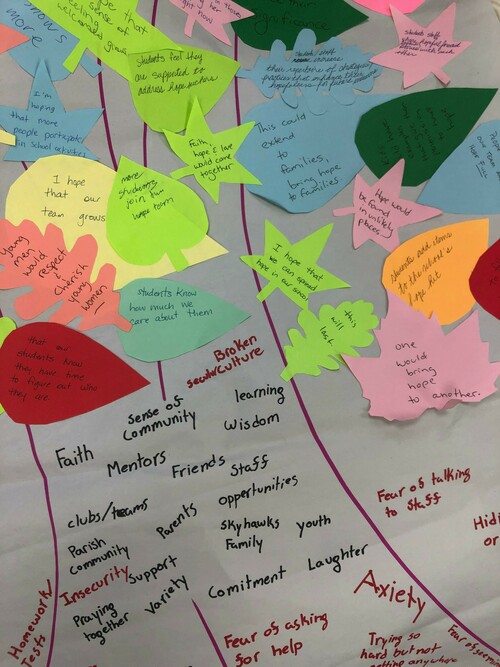
To keep this promise of ensuring success for every First Nations, Métis, and Inuit student, we are committed to achieving these strategies in our Student-Focused School Improvement Plan 2019-2020, which is based on our Division Three-Year Education Plan for 2019-2022.
Students will:
- use Gallup Student Poll Survey results to set goals to increase hope, engagement, entrepreneurial aspirations, and career and financial literacy;
- work through innovative partnerships between home and school to address push/pull factors;
- learn how to take an active role in Truth and Reconciliation;
- learn with resources (e.g., Indigenous literature, prayer table artifacts) and strategies suggested by the Advisory committee;
- learn with their parents about the Division’s work in Truth and Reconciliation through the Leadership Committee;
- engage in meaningful activities on National Indigenous Peoples Day as part of Truth and Reconciliation.
We are excited to be entering year four of our professional learning journey with all staff in our division. This year, with the mandate of Alberta Education’s Teaching Quality Standard, we are focused on teaching for conceptual understanding to ensure that we address the key concepts outlined for teachers to learn about and integrate into their everyday classroom practices:
Applying Foundational Knowledge about First Nations, Métis and Inuit
5. A teacher develops and applies foundational knowledge about First Nations, Métis and Inuit for the benefit of all students.
Achievement of this competency is demonstrated by indicators such as:
(a) understanding the historical, social, economic, and political implications of:
- treaties and agreements with First Nations;
- legislation and agreements negotiated with Métis; and
- residential schools and their legacy;
(b) supporting student achievement by engaging in collaborative, whole school approaches to capacity building in First Nations, Métis and Inuit education;
(c) using the programs of study to provide opportunities for all students to develop a knowledge and understanding of, and respect for, the histories, cultures, languages, contributions, perspectives, experiences and contemporary contexts of First Nations, Métis and Inuit; and
(d) supporting the learning experiences of all students by using resources that accurately reflect and demonstrate the strength and diversity of First Nations, Métis and Inuit.
Our approach to professional learning is to build staff capacity in understanding and applying foundational knowledge about our First Nations, Métis, and Inuit communities by weaving such concepts (treaties and agreements; legislative histories and current legislative commitments; residential schooling and related legacies) through story-focused pedagogies and practices, which are foundational to Indigenous ways of knowing (Brokenleg, 2019)—
Bring life to stories that were legislatively erased, intentionally lost, and learn, one story at a time, who we are, how we came to be, and where we need to go to repair intergenerational trauma. When I say ‘we’, I mean ‘the individual’ and that is the only way to begin the journey of ‘truth’ and ‘reconciliation. (Brokenleg, 2019).
Through a focus on sharing our stories of local community members who can amplify meaning by offering their stories of faith, hope, and resilience, we intend to weave such learning into the fabric of professional learning of all learning communities in our division:
- First Nations, Métis, and Inuit Advisory Committee
- Chaplains
- Learning Support Facilitators
- Early Learning Educators
- Pedagogy Teams (Division 1, 2, 3, 4)
- School and District Administrators (Christ-Centred Learning Community - CCLC)
2018 - 2019 School Year
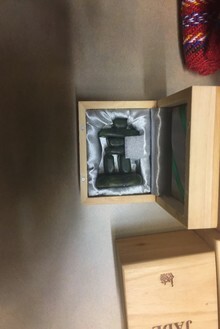
Our district has developed a Student-Focused version of our Three-Year Education Plan 2018-2021, which articulates the district strategies for school improvement from a student stance (written in green below). In the month of September, our committee work is advancing our key strategies to ensure that Alberta Education System Supports First Nations, Métis, and Inuit Students’ Success (Outcome Two).
Students will use the Gallup Student Poll Survey results to set goals to increase hope, engagement, entrepreneurial aspirations, and career and financial literacy. Our Building Communities of Hope project in St. Albert Catholic High School and École Secondaire Sainte Marguerite d'Youville is a school-university partnership to work with students to make visible sources of hope in their lives within and beyond school. Their experiences in developing visual and digital representations of “hope spaces” will be shared with others in our district community.
Students will experience how indigenous culture and spirituality connects with our Catholic faith. To connect our Catholic faith to Indigenous culture and faith, our Religious Education Consultant is introducing School Chaplains to prayer table artifacts that celebrate our Indigenous communities’ identities, spirituality, and cultural connections. In the September Chaplain meeting, each School Chaplain was given a Métis sash and inuksuk. Some basic facts about each artifact were shared and discussed (e.g., the interwoven threads of the Métis sash represent the cultural sharing between French and Indigenous communities; and the inuksuk symbolizes that “someone has been here” and “this is the way”). Such connections will be visible on prayer tables and used to teach to students through religious education programming and school-wide liturgies and events. Elders and parents of Indigenous students from Alexander First Nation First Nation, St. Albert, Morinville, and Legal communities will be invited to share their histories and stories, and teachings about such artifacts.
Students will learn how to take an active role in Truth and Reconciliation through activities shared with them through teacher professional development led within our district. On September 26th, our ATA Walking Together Consultant led staff through a session to take back to their schools or to lead at district-wide PD on November 9th about Indigenous Alberta and Indigenous Ways of Knowing.
Sessions like this are important to begin to prepare our staff to meet the Teaching Quality Standard (2018) that will come into effect September 1, 2019: A teacher develops and applies foundational knowledge about First Nations, Métis, and Inuit for benefit of all students. Achievement of this competency is demonstrated by indicators such as: “supporting learning experiences of all students by using resources that accurately reflect and demonstrate the strength and diversity of First Nations, Métis, and Inuit” communities and individuals.
2017 - 2018 School Year
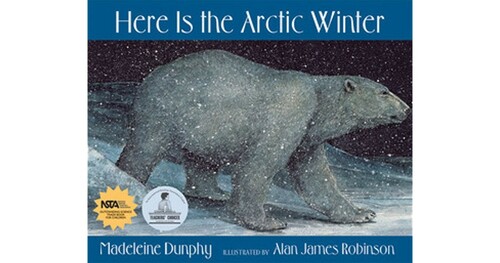
Indigenous Literature Kit
This collaborative project began with a mission – to create a professional learning resource that would support educators to grow in their collective understanding of Truth and Reconciliation. In the Truth and Reconciliation Commission of Canada: Calls to Action (2012) report, the Canadian government defined “reconciliation” as learning what it means to establish and maintain mutually respectful relationships between indigenous and non-indigenous peoples.
To that end, there must be awareness of the past, acknowledgement of the harm that has been inflicted, atonement for the causes, and action to change behaviour (pp. 6–7). The TRC presented 94 Calls to Action that outline concrete steps that can be taken to begin the process of reconciliation, and we focused on Education for Reconciliation, 62-65 (pp. 7-9). As educators, we sought the guidance of our local elders in understanding Education for Reconciliation. They urged us “to do something” and “not just to talk about it”.
Given their extensive backgrounds in education and health care in the Cree community of Alexander First Nation Kipohtakaw, they had many excellent suggestions as to how to begin this journey. One of the first steps was to share the stories of residential school survivors through elders and through multimodal texts (print, visual, digital, drama, art). “Put literature in the libraries and in the hands of our students” and “share the work of indigenous role models.” To that end, we approached the Executive Director of the Edmonton Regional Learning Consortium (ERLC), Therese deChamplain-Good and our local St. Albert-Sturgeon Regional Collaborative Service Delivery (RCSD) community and applied for grant funds to develop this kit.
We are now using this kit (literature and activities) in K-12 classrooms and in our School Council and Board meetings.
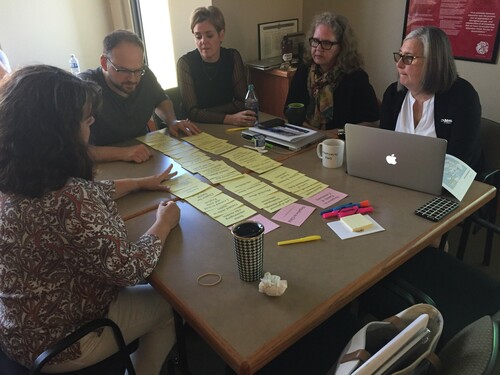
Residential Schooling Education for All Staff
Historically, residential schools have been known as locations of cultural assimilation and genocide of First Nations, Métis, and Inuit children across Canada. Today, Alberta schools are working towards reconciliation of such a history by sharing the "truth" of this past and looking at how to best cultivate positive and respectful relationships among both Indigenous and non-Indigenous students.
The Advisory Committee Members participated in a residential schooling session to enable them as lead staff to share and educate each of the 16 district schools. In the school sessions, staff were actively engaged in examining the history, impacts, and legacy of residential schooling, including the effects of inter-generational trauma. Tools, resources, and strategies that contribute to the development of mutually respectful relations between Indigenous and non-Indigenous Canadians were explored.
2016 - 2017 School Year
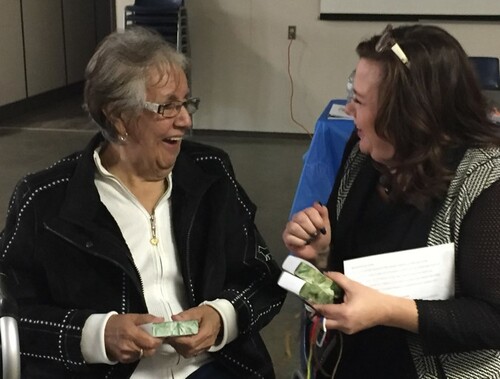
Blanket Exercise
The Blanket Exercise is “a teaching tool to share the historic and contemporary relationship between Indigenous and non-Indigenous peoples in Canada” (http://kairosblanketexercise.org/ ). The Blanket Exercise involves participants in reading scripts and taking on roles of Indigenous and non-Indigenous figures in the scripts. The scripts re-present what took place from the late 1800s to the present between Indigenous and non-Indigenous peoples through well-known historic events such as residential schooling. Through reading scripts and taking on the roles, participants, in a sense, re-live what happened. In Greater St. Albert Catholic Schools, we developed locally written scripts in addition to Kairos scripts. The locally developed scripts were constructed with the support of our elders, Edna and Ella Arcand, who are Cree First Nation elders from Alexander First Nation. Because the history shared through this dramatic teaching tool involves participants in our local history, participants tell us that they “feel” very moved by taking part in the process.
Staff Participation
On December 9, 2016 and January 27, 2017, we have provided all staff within our jurisdiction and outside members from within our local community an opportunity to take part in our locally written version of the Kairos Blanket Exercise for adults. We worked with our elders, Ella and Edna Arcand, to contribute locally developed scripts about our indigenous communities’ histories, emphasizing the knowledges, perspectives, and histories of our Cree First Nations peoples who lived through residential schooling in the local areas within and surrounding St. Albert.
School Participation
Our 16 schools are leading the way in sharing this learning opportunity with their parents through communication with their School Councils and through opportunities to take part in blanket ceremonies at their schools.
Parent Participation
Our 16 schools are leading the way in sharing this learning opportunity with their parents through communication with their School Councils and through opportunities to take part in blanket ceremonies.



